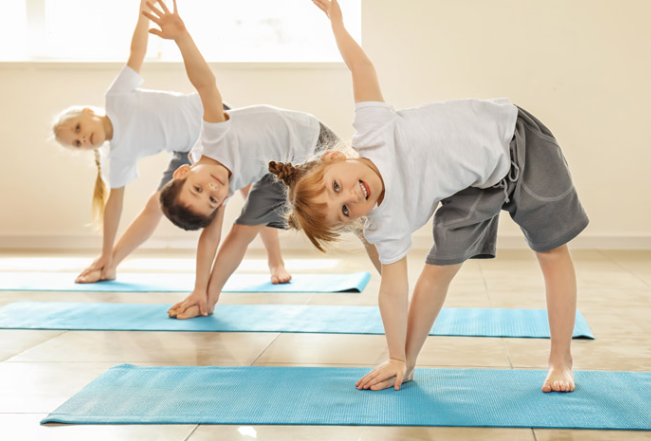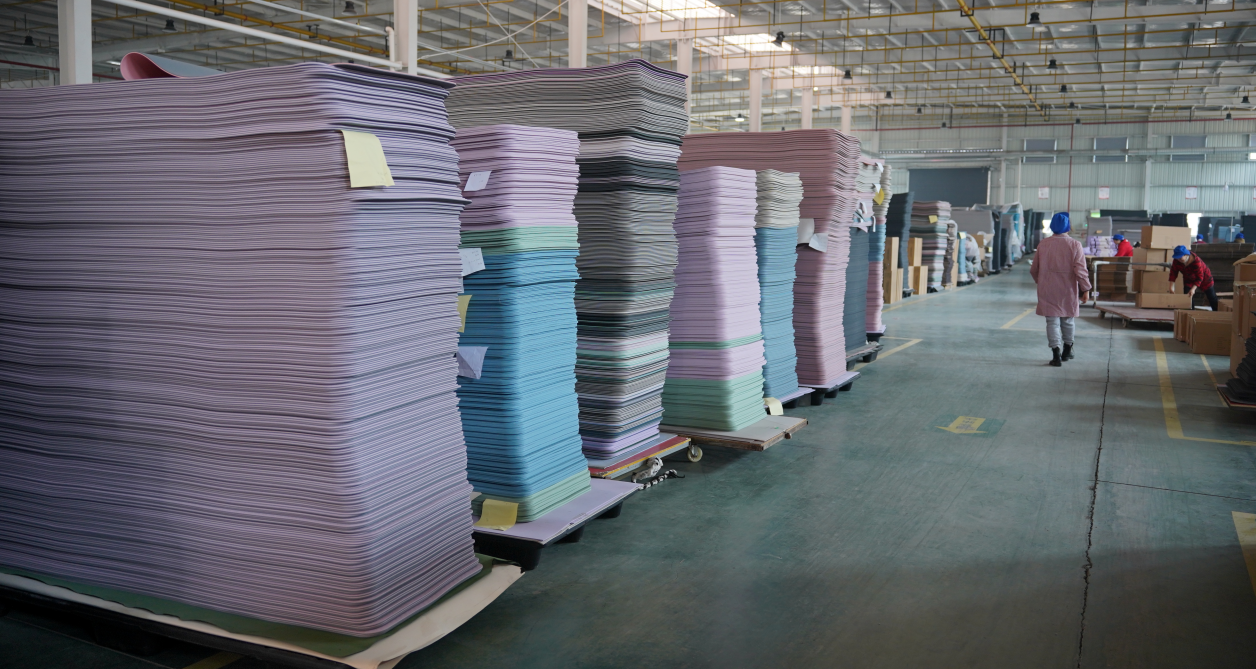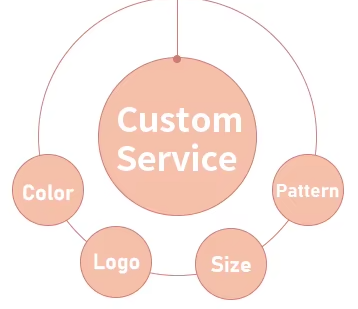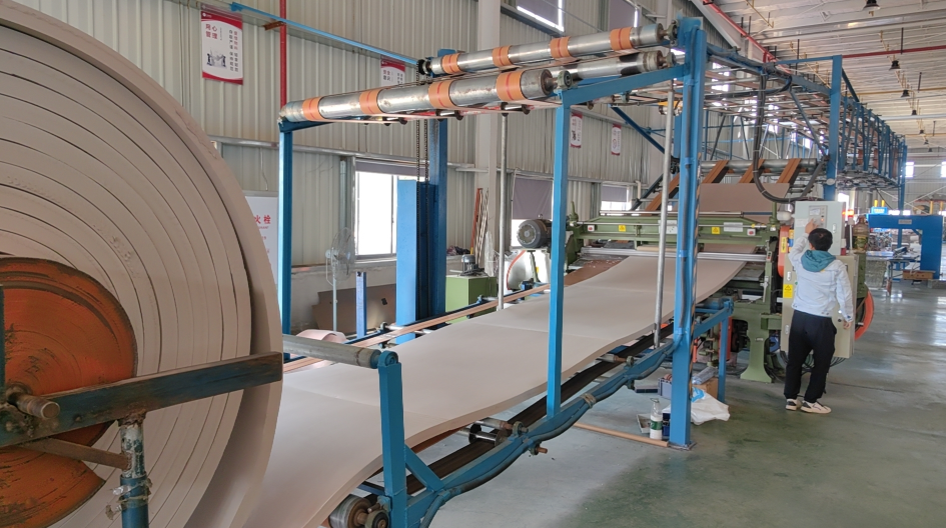For children’s yoga, I believe the right yoga mat is really important. Children’s yoga mats are made to meet the special needs of kids. I feel these mats must put safety first. They should have the correct thickness and grip. This helps prevent slips and tumbles while kids practice.

Enhanced Safety Features
Kids can get hurt more easily. This is because they are playful and their movement skills are still growing. I recommend mats with extra padding. These protect kids from hard floors. Also, non-toxic materials are very important, as kids are more sensitive to bad chemicals. I suggest parents and teachers choose mats that say “PVC-free” and “eco-friendly.” This helps keep children safe.
Comfort and Design
To get children interested in yoga, comfort is very important in my view. I find that wider and softer mats give kids a comfy area. Here, they can stretch and play. Bright colors and fun patterns can also encourage children to do yoga. This makes it a fun time for them. I believe these attractive designs can help kids link good feelings with being active.
Age Appropriateness
Children’s mats should be right for different ages; that’s my suggestion. For example, younger kids might like smaller, brighter mats. Older kids might want designs that show what they like. I think manufacturers need to provide many choices. These choices should attract different age groups. This helps kids keep doing yoga.
Quality and Durability
I believe putting money into good-quality mats is important so they last long. Kids can be tough on their things. So, the mats need to handle daily use and not break easily. When you pick a maker, I recommend asking about the materials. Also, ask how long the mats should last.
So, to wrap up, when choosing a maker for children’s yoga mats, I always look at safety, comfort, designs for different ages, and how long they last. If brands pay attention to these points, I am confident they can offer a product that young yogis need. This also helps kids build a healthy and active way of life.
What I Look For in a Kids Yoga Mat Manufacturer
If I’m picking a kids yoga mat manufacturer, I check a few key things. I want to be sure the mats are safe and kids will like them. This helps parents and schools decide.
My Priority: Safe, Non-Toxic Materials and Kid-Specific Certifications
Soft and Lightweight Materials: I recommend choosing mats made from EVA, TPE, or NBR, as these materials are soft, lightweight, and free from harmful substances. They’re also gentle on joints, making them ideal for longer sessions like Yin Yoga.
Meeting Safety Standards: I always ensure the mats comply with international safety standards such as EN71, CPSIA, REACH, and RoHS. This not only protects users but also adds credibility when marketing the products.
Easy-to-Clean Mats: I suggest selecting mats that are antimicrobial and easy to clean, as this supports better hygiene in both home and studio settings. Low-maintenance mats also tend to last longer and maintain their appearance over time.

Getting the Right Size, Thickness, and Design for Kids
Kid-Sized Mats: In my experience, standard dimensions like 120 cm × 60 cm are well-suited for children, offering enough space without being bulky. A properly sized mat helps kids stay focused and maintain proper alignment during practice.
Ideal Thickness: I’ve found that mats with a thickness of 5mm to 8mm provide a good balance of cushioning and portability. This range protects growing joints while still being light enough for kids to carry themselves.
Gentle, Grippy Textures: The surface texture should be soft and skin-friendly, especially for younger users. At the same time, it must offer enough grip to help children feel secure as they learn new poses and movements.

How Flexible Are They with Custom Designs and Branding? I always ask.
Branding Choices: I always check whether the supplier can print logos or offer custom designs—such as animals, characters, or even educational content. Custom visuals not only enhance the mat’s appeal to kids but also help reinforce branding and engagement.
OEM/ODM Possibilities: I also ask about private label options and whether they support OEM or ODM services. This flexibility is crucial for building a unique brand identity and standing out in a competitive market.
Bundling Accessories: It’s helpful to know if the supplier can package mats with extras like carrying bags, flash cards, or yoga guides. Bundled products often add value for parents and educators while increasing overall customer satisfaction.
Can They Make Enough Mats on Time? This is what I investigate.
Handling Big Orders: I make sure the manufacturer can handle large orders. This is important for seasonal pushes or when schools buy in bulk.
Clear Timelines: I always request clear timelines for samples and for full production runs.
Flexible Plans for Production: I check if they can adjust for urgent orders or regular repeat orders. I know things can change, so this flexibility is key.
Are They Ready for Global Markets? I assess their Export Know-How.
Paperwork for Different Regions: I believe it’s essential that suppliers understand the documentation requirements for markets like the U.S., EU, and Japan. In my experience, having the correct paperwork in place avoids costly delays, compliance issues, and unnecessary stress. A supplier with this knowledge is a valuable long-term partner.
Help with Customs: I check whether the supplier offers support with customs clearance, barcoding, and product labeling when needed. This kind of assistance can greatly simplify the import process and help ensure your products meet destination-country regulations. It also shows their commitment to customer service beyond just manufacturing.
Proof of Exporting: I always look for evidence that they’ve successfully exported to my target markets before, such as shipping records or references. A proven track record shows they’re familiar with international standards and capable of handling global logistics reliably. It gives me more confidence when choosing to work with them.
Good Communication, Service, and Potential for a Lasting Partnership – That’s my goal.

Dedicated Help: I ask whether they offer dedicated account managers or have a specialized team for international sales. Having a consistent point of contact makes communication smoother and helps build trust over time. It also ensures that issues are addressed quickly and efficiently.
Openness in Production: I look for transparency in every stage—sample testing, contract negotiations, and the actual manufacturing process. Clear visibility into how things are done shows professionalism and reduces the chance of surprises. It also helps align expectations and timelines from the very beginning.
Policy After the Sale: I always check for a clear after-sales service policy, covering returns, quality issues, and warranty terms. This reflects how confident they are in their product quality and how committed they are to long-term customer satisfaction. A strong policy also provides peace of mind when placing larger orders.
Expert Opinion:
“As a children’s yoga instructor and product development consultant, I’ve learned that choosing the right manufacturer for kids’ yoga mats is very important. It’s not just about the technical details. What sets great manufacturers apart, in my view, is their understanding of child development. The best partners I’ve worked with actually test their products with children of different ages. They watch how kids interact with various materials and designs. This research helps them create mats that support good posture and also spark a child’s imagination. I’ve seen it myself: the right mat can turn a hesitant child into a keen yogi! So, when I check out manufacturers, I always ask about their testing process with actual children. This shows me if they are committed to making products that help young yogis, or if they are just making adult products smaller.“
———— Sarah Mitchell , Child Development Specialist and Certified Kids Yoga Instructor with 15+ years of experience developing children’s wellness products
What To Look Out For, In My Opinion
When you’re picking a manufacturer for children’s yoga mats, I think it’s really important to spot any warning signs early on. These signs can tell you if there might be problems down the road. So, based on my experience, here are a few key things I always suggest you keep an eye on:
Missing Safety Papers – A Big Concern for Me
I strongly recommend you pass on makers who can’t show you safety certificates from independent, third-party testers. You need to make sure their mats meet important safety standards like EN71, CPSIA, REACH, and RoHS. For me, having these certificates shows the maker is serious about producing safe mats for kids, and that’s non-negotiable.
Samples Don’t Match the Real Deal? I’d Worry.
If the sample yoga mats you get are much better quality than the actual products in your main order, that’s a big warning sign for me. I believe consistency is super important for children’s mats. They absolutely must keep the same quality and safety features in every single mat.
Bad Communication and Not Being Dependable – Not Good Signs
From my experience, warning signs definitely include weak communication, consistently missed deadlines, or confusing pricing. I think a good, trustworthy maker will give you clear schedules. They should also keep in touch regularly and reliably throughout your project.
Summary: What Makes a Great Children’s Yoga Mat Manufacturer
I believe choosing a great children’s yoga mat manufacturer means looking at a few important things. We need to think about quality, safety, and how the mats are designed.

Key Factors to Consider
-
Safety and Non-Toxic Materials: I think the most important thing is using soft, light materials like EVA, TPE, or NBR. These materials should not contain harmful substances. I also recommend checking if the mats meet safety standards like EN71, CPSIA, REACH, and RoHS.
-
Customization Options: I believe a good manufacturer should offer flexible custom designs. This means they can help with your branding, create unique patterns kids will love, and provide custom packaging choices.
-
Production Capabilities: I think it’s really important for a manufacturer to manage large orders smoothly. This ability is key during busy seasons or if schools are buying many mats. I also look for clear production schedules and how they handle rush orders; these aspects are important to me.
-
Experience with Global Markets: I suggest a manufacturer who understands exporting to places like the U.S. and EU. In my view, it’s very important they know how to deal with local customs and all the needed paperwork. My experience shows this an make a big difference.
-
Communication and Customer Service: I think a reliable partner offers dedicated support and keeps communication clear all through production. Getting regular updates really helps build a trusting relationship, based on my experience.
Additional Considerations
-
Durability: I suggest looking for manufacturers that make tough mats. These mats need to hold up to active kids using them every day.
-
Design Appeal: I find that bright colors and fun patterns are key to get kids excited about yoga. The designs should be eye-catching, but I always make sure they don’t sacrifice safety.
Summary
For me, safety is always the top concern. I also think having flexible designs and reliable production is just as vital. I see a good yoga mat manufacturer as more than just someone who supplies products; they are a partner invested in your growth. In my experience, the right partner helps you expand your business fast, reduces potential problems, and builds your brand’s reputation.

